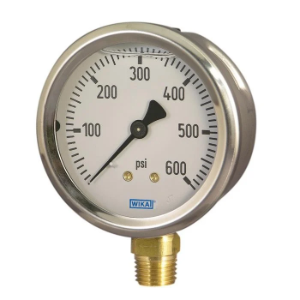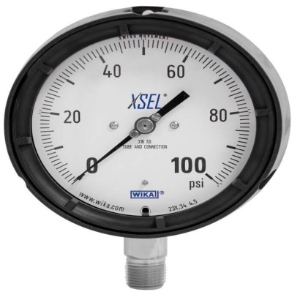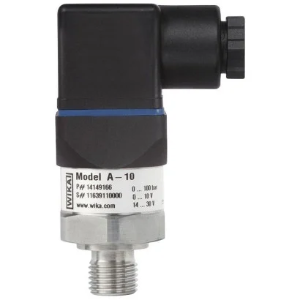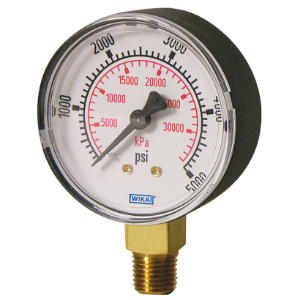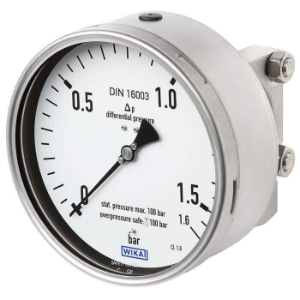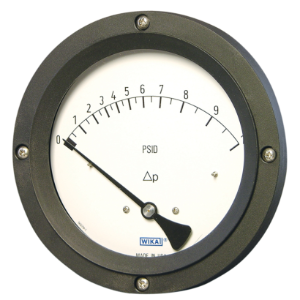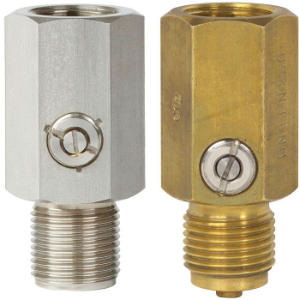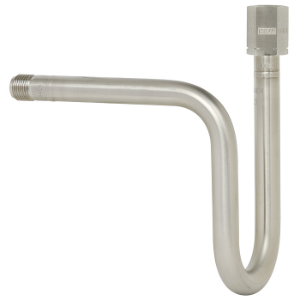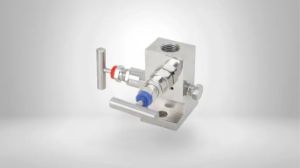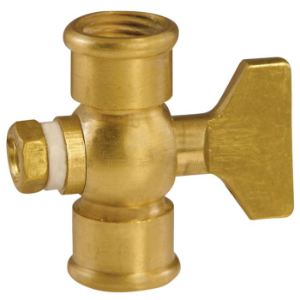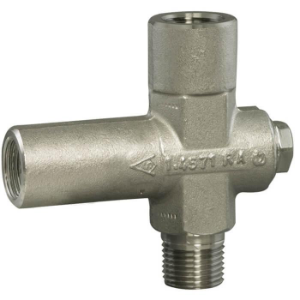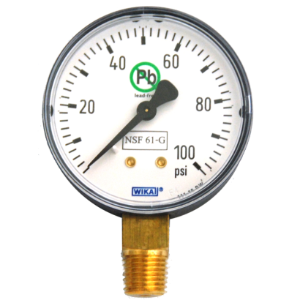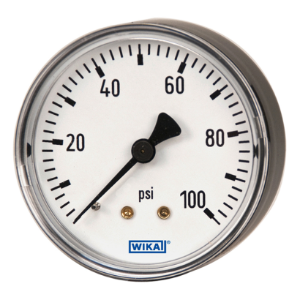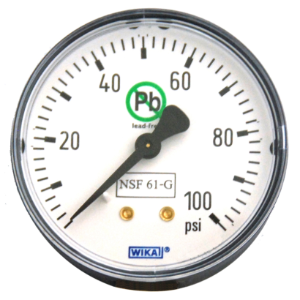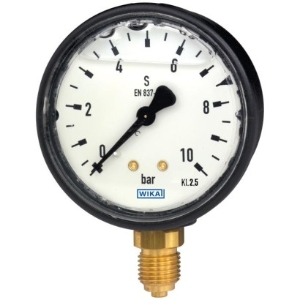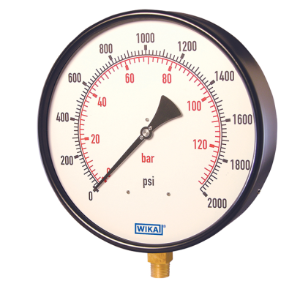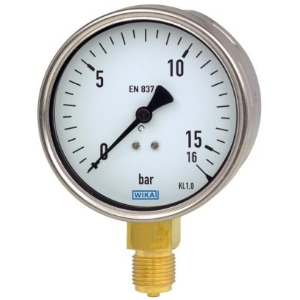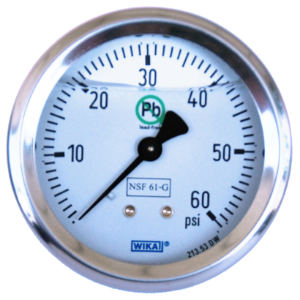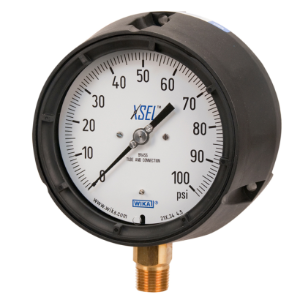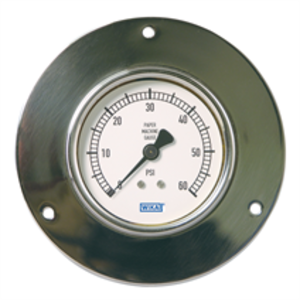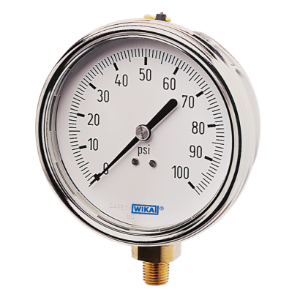Pressure Control - WIKA
Centro carries a complete selection of pressure control products available to purchase online. Our inventory includes pressure gauges, switches, and pressure transmitters from leading manufacturers. Pressure contro...
Industrial gauges are versatile pressure measuring devices used in a wide range of industrial applications. They are designed to withstand demanding environments and provide accurate pressure readings for processes such as manufacturing, HVAC systems, hydraulic systems, and pneumatic systems. To suit different industrial requirements, industrial gauges are available in various sizes, pressure ranges, and connection types. They are known for their durability, resistance to vibration and shock, and ability to provide precise pressure measurements in industrial settings.
Process gauges are instruments explicitly designed for monitoring and measuring pressure in industrial processes. They are built to withstand harsh operating conditions, such as high temperatures, corrosive environments, or high pressure levels. Process gauges are commonly used in industries like oil and gas, chemical manufacturing, and power generation, where accurate and reliable pressure monitoring is crucial.
Pressure transmitters, also known as pressure transducers, are instruments used to measure and transmit pressure readings as electrical signals. These devices convert pressure into an analog or digital signal, which can be utilized for monitoring, control, or data acquisition purposes. Pressure transmitters offer accurate and reliable pressure measurement in industrial processes, HVAC systems, manufacturing, and other applications. They provide real-time pressure information, enabling precise control, system optimization, and preventive maintenance.
Commercial gauges are pressure gauges primarily used in commercial applications, such as retail, building management, and general-purpose industrial settings. These gauges are often designed for lower pressure ranges and standard environments. Commercial gauges can be found in applications such as HVAC systems, water supply systems, pneumatic tools, and process control in commercial buildings. They are cost-effective solutions for pressure monitoring needs in less demanding commercial environments.
Pressure gauges are instruments used to measure the pressure of fluids or gases in various industrial, commercial, and residential applications. They visually indicate the pressure levels, allowing operators to monitor and control processes effectively. Pressure gauges consist of a dial or digital display with a needle or numeric readout representing the pressure measurement in units such as PSI (pounds per square inch) or kPa (kilopascals). They typically feature a Bourdon tube, diaphragm, or other sensing elements that convert the applied pressure into a mechanical displacement, which is then displayed on the gauge. Pressure gauges are available in different types, including analog and digital, with varying accuracy levels and pressure ranges to suit specific application requirements. They are commonly used in oil and gas, manufacturing, HVAC, and automotive industries, where pressure monitoring is critical for operational safety, system performance, and quality control. Pressure gauges provide valuable feedback for adjusting process parameters, detecting leaks or anomalies, and ensuring the optimal functioning of equipment and systems.
Differential pressure gauges are instruments used to measure the difference in pressure between two points in a fluid system. They typically consist of two pressure ports connected to the system and a gauge that displays the pressure difference. Differential pressure gauges gauges are for monitoring filter conditions, flow rates, and pressure drops across components like pumps and valves in various industrial processes. Browse our selection below or contact us to speak with a product expert.
Differential pressure liquid control products are essential components used in various applications to monitor and control the pressure difference between two points in a liquid system. These products are designed to measure the pressure drop across filters, pumps, valves, or other flow control devices. They are crucial in maintaining proper flow rates, preventing system damage, and ensuring optimal performance. Differential pressure liquid control products typically consist of a differential pressure transmitter or sensor, a flow element (such as an orifice plate, venturi tube, or flow nozzle), and associated piping and instrumentation. The transmitter or sensor detects the pressure difference and converts it into a proportional electrical signal, which can be used for monitoring, control, or alarm. These control products find applications in oil and gas, chemical processing, water and wastewater treatment, and HVAC systems. They help optimize system efficiency, improve process control, and ensure liquid systems' safe and reliable operation by providing accurate and real-time differential pressure measurements.
Pressure snubbers are small devices placed in-line with the pressure gauge to dampen sudden pressure fluctuations or pulsations. They help protect the gauge from damage caused by rapid pressure changes, thereby extending its lifespan and ensuring accurate and stable readings. Siphons, gauge cock valves, and pressure snubbers play crucial roles in pressure measurement systems by improving safety, accuracy, and the longevity of pressure gauges in various industrial applications.
Pressure control accessories encompass a range of supplementary components and tools used to enhance the functionality, installation, or protection of pressure control systems. These accessories include pressure relief valves, pressure gauges, snubbers, manifolds, fittings, and connectors, among others. Pressure control accessories ensure proper system integration, accurate pressure measurement, secure connections, and protection against overpressure or contaminants. They play a crucial role in optimizing the performance, safety, and reliability of pressure control systems in various industries.
Centro offers pressure gauges, vital instruments that measure and indicate fluid or gas pressure within a system. These gauges are commonly employed in various industries, including manufacturing, oil and gas, automotive, and HVAC systems. Pressure gauges consist of a dial or digital display that shows the pressure reading and a sensing element that detects the pressure and converts it into a readable form. They come in different types, such as Bourdon tube gauges, diaphragm gauges, and digital pressure gauges, each suited for specific applications and pressure ranges. Pressure gauges provide crucial information for monitoring and controlling processes, ensuring optimal performance and safety. They enable operators to gauge system pressure levels, detect abnormalities, and make informed decisions regarding system adjustments or maintenance. Pressure gauges may also incorporate features such as maximum pressure indicators, adjustable pointers, or alarms for added functionality. With their accuracy, reliability, and ease of use, pressure gauges are crucial in maintaining operational efficiency and safety in various industries.
Manifold valves are used in fluid handling systems to control the flow of liquids. They consist of multiple valve outlets connected to a single inlet, allowing for precise regulation of flow rates, direction, and isolation of different fluid paths. Browse our selection below or contact us to speak to a product expert.
Gauge cock valves, also known as gauge valves or isolation valves, are installed between the pressure source and the gauge. They allow for easy isolation and removing pressure gauges without interrupting the process flow. The gauge can be safely removed or replaced by closing the valve for calibration or maintenance.
A syphon is a simple yet effective tube-shaped device that consists of two legs bent in a U-shape. The purpose of the syphon is to transfer liquid from a higher container or location to a lower one without the need for any external pumping or suction. One leg of the syphon is inserted into the higher container or source of liquid, while the other leg is placed into the lower container. The liquid in the higher container initially fills the syphon's legs, creating a continuous flow due to the difference in pressure between the two ends. Gravity then causes the liquid to flow through the syphon, moving from the higher to the lower container. Syphons are commonly used in various applications, including laboratory experiments, aquariums, irrigation systems, and fluid transfers in industrial processes. They provide a simple and efficient means of transferring liquids over a vertical or horizontal distance without the need for complex pumps or mechanical devices.
Enhance the performance and reliability of your instrumentation systems with our premium range of instrument valve accessories. Whether you need block and bleed gauge valve accessories for safe isolation during maintenance or gauge adaptors for seamless connections, we've got you covered. Our high-quality bleed tees and bleed plug valves provide efficient pressure release and fluid drainage, keeping your operations running smoothly. Improve your system's safety and efficiency with these essential components designed for durability and peak performance in even the most demanding industrial environments.
Configure product to see pricing
Configure product to see pricing
Configure product to see pricing
Configure product to see pricing
Configure product to see pricing
Configure product to see pricing
Configure product to see pricing
Configure product to see pricing
Configure product to see pricing
Configure product to see pricing
Configure product to see pricing
Configure product to see pricing
Configure product to see pricing
Configure product to see pricing
Configure product to see pricing
Configure product to see pricing
Configure product to see pricing
Configure product to see pricing
Configure product to see pricing
Configure product to see pricing
Configure product to see pricing
Configure product to see pricing
Configure product to see pricing
Configure product to see pricing

